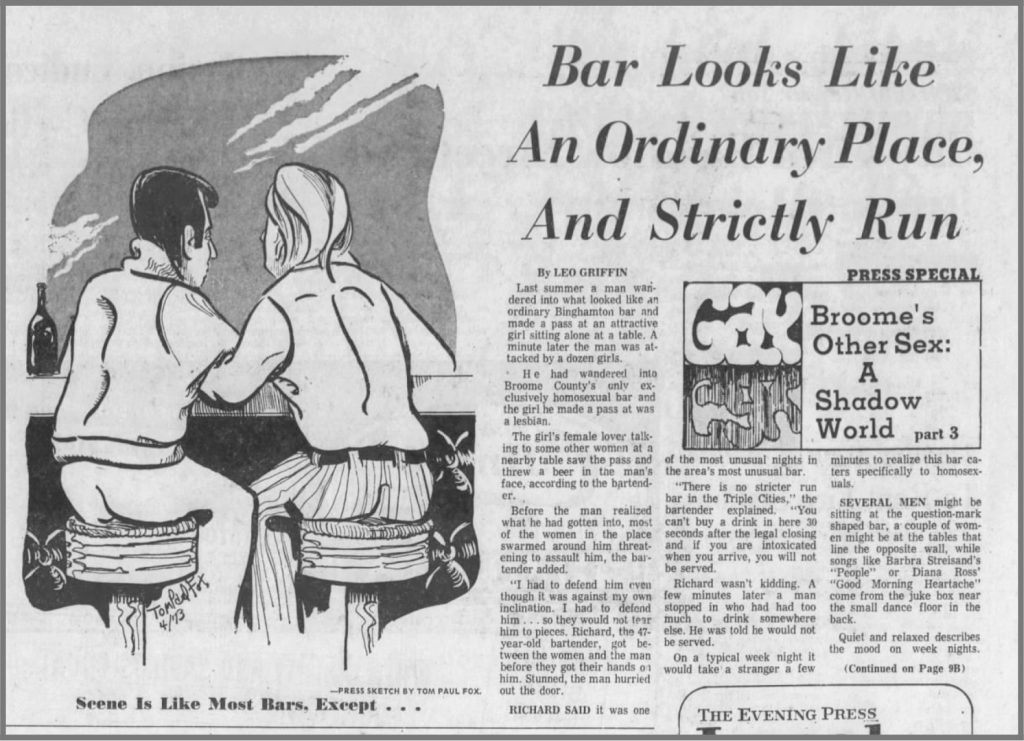
Tucked in a Chenango Street parking lot, Binghamton’s last gay bar carries on the tradition of an area once rife with LGBTQ hotspots. Squiggy’s Bar is owned and run by Binghamton community member Jo Strong, a veteran of the Triple Cities’ thriving gay and lesbian social scenes of the ‘70s, ‘80s and ‘90s.
Originally from Deposit, New York, a town in nearby Delaware County, Strong moved to Binghamton in the mid-‘70s to work at General Electric. While she missed out on a lot of the party scene because she was working while going to night school, she still frequented many of the era’s popular bars. As early as the ‘50s, Binghamton was home to an LGBTQ social scene that became increasingly less covert with the advent of the gay liberation movement.
According to Greene community member Bob Bullock, a bar called Poor George’s beachcomber served as a clandestine meeting place in the late ‘50s and early ‘60s. When it was razed for urban renewal, the owner opened a new bar called the Gaslight House, and the crowds followed.
In the ’70s, crowds flocked to the Cadillac Bar and Grill, which was located at the corner of Court and Front near what is now Peterson’s Tavern. The Cadillac served as a social center for much of the Binghamton Gay Liberation Group, a group that consisted heavily of Binghamton University students. It was also home to Partners, Binghamton’s first gay women’s softball team.
Binghamton community member John Cramer shared memories of hanging out outside the Cadillac before he was old enough to go inside.
“It was an exciting time,” he wrote in a Facebook comment. “We were on the edge of a greater awareness and acceptance in the community.”
Lenny’s on Court Street, which existed until 2015 through a series of incarnations as Risky Business, Prism and finally Merlin’s, first functioned as a private club for gay men. The bar charged membership fees to deter outsiders and keep patrons from being outed.
Strong said the community of gay men at Lenny’s inspired gay women to create a similar space of their own. Herizon, located on State Street, was a private club founded in 1975. At its peak, the club’s dues-paying membership included over 300 women, a lively community of volunteers and patrons that hosted concerts, campouts, cabarets and more. After changing locations once, Herizon closed by the mid-’90s due to membership petering out and volunteers becoming scarce.
Strong said the gradual disappearance of the area’s gay bars is due to no single factor, but a number of changes in the area’s population.
“During the ‘80s we lost a lot of people to AIDS, and people started to move out of the area when the companies left,” she said.
Changes in dating culture at large might also be to blame. Strong said that while technology has made it easier to connect with patrons, it has also led people toward dating sites when looking to meet partners.
“Social media has changed a lot of things,” she said. “People aren’t meeting at the bars anymore.”
Several other spots have sprung up and closed through the decades — The Green Onion, Wizard’s, Numbers and most recently Zipper’s, to name a few. Pop-up bar and nightclub Rosalind, open for just a few months in 2017, hosted regular drag shows at its location on Pine Street.
This brings us at last to Squiggy’s. Decorated with dreamy blue and purple lights, quirky holiday decor and tinsel garlands, the bar’s single long room is paneled with old mirrors and furnished with simple wooden tables and chairs. Strong patronized the bar in the ’80s, buying it in 1990 when the previous owners decided to sell. Nowadays, she runs the bar herself with very little staff, hiring additional bartenders just for special events.
Strong said her clientele has varied in her 29 years at the bar. When she first bought Squiggy’s, it garnered a reputation for being a “women’s bar”, but now a lot of her regular customers are older men. The bar draws mixed crowds for popular events like Divas After Dark, a weekly drag show organized by local queens Dede Kupps and Katrina, and the bar’s annual Toys for Tots benefit drag show in remembrance of late Prism owner Doug Guiles.
Adam Bombay, a Binghamton community member and drag queen who performs locally as India Bombay, said that he’s seen a recent rise in the number of BU students at Squiggy’s, mainly for drag events and fundraisers.
“We used to have a lot of fun at Squiggy’s, and as an older person now in my 30s I see it coming back a little bit,” he said.
Squiggy’s operates as a functional and supportive space as well as a venue for entertainment. A counter by the bar boasts a jar of free condoms supplied by Southern Tier AIDS Program, and Strong can often be found cooking meals for patrons on Sunday nights.
Bombay said the bar has always been more than just a spot for hookups or partying: It serves as a home away from home, filling an especially profound role in the history of Binghamton’s LGBTQ positive spaces.
“At [other bars] you always felt welcome, but you didn’t feel like you were part of a family,” he said. “At Squiggy’s, it’s a place you want to be.”


